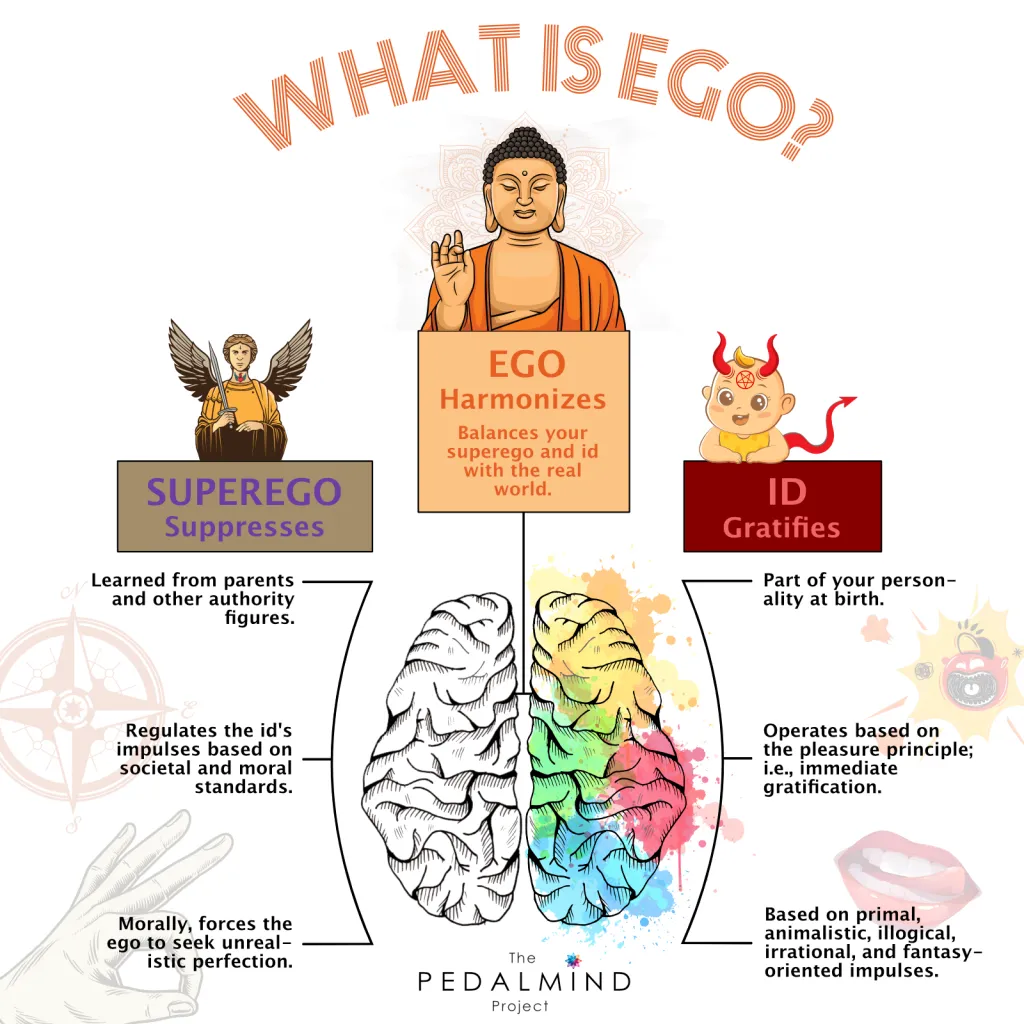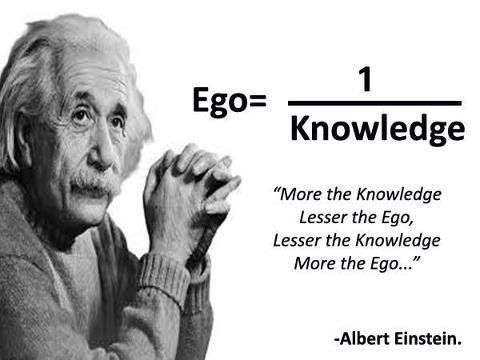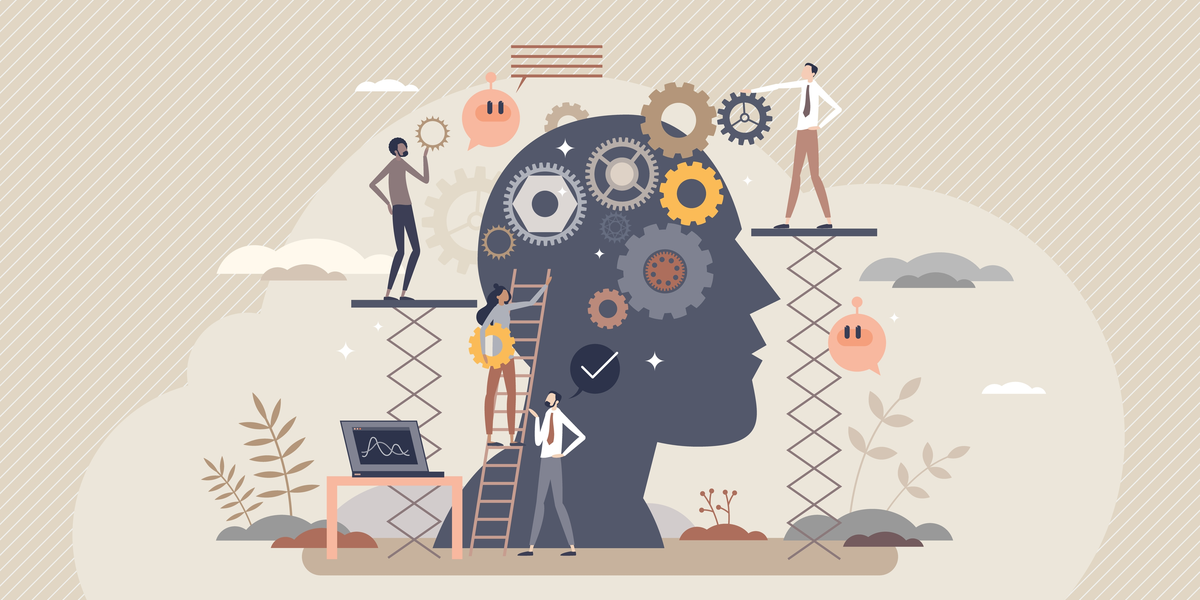Content Summary
The concept of the ego has intrigued philosophers, psychologists, and spiritual thinkers for centuries. It represents the self-identity of an individual, encompassing thoughts, feelings, and perceptions that define who we are.
The ego is a complex and multi-faceted psychological construct that significantly influences how people think, behave, and interact with the world around them. In this article, we will explore what the ego is, how it affects people's lives, its importance up to a certain level, and when it becomes arrogant.
Moreover, we will discuss how to deal with individuals who exhibit arrogant ego levels and identify the signs of such behavior.
What is the Ego
In psychological terms, the ego refers to the conscious part of the mind that mediates between the individual's instinctual drives (id) and their internalized moral standards (superego).
Sigmund Freud, the father of psychoanalysis, first introduced this structural model of the psyche. The ego is responsible for managing the conflicting demands of the id and superego, ensuring that individuals navigate through reality in a socially acceptable manner.
Beyond the Freudian perspective, the ego also represents a person's self-image, their perception of themselves in relation to others, and their self-esteem. It plays a crucial role in shaping an individual's personality, decision-making, and emotional responses.

How Does the Ego Affect People's Lives
The ego exerts a profound influence on various aspects of human lives, impacting emotions, behavior, relationships, and personal growth. When the ego is balanced and healthy, it fosters confidence, self-assurance, and a positive self-image. It allows individuals to interact with others effectively, set healthy boundaries, and pursue their goals.
However, problems arise when the ego becomes imbalanced, leading to different issues:
Insecurity and low self-esteem: An underdeveloped ego may result in feelings of inadequacy and a constant need for validation from others.
Fear of judgment: An overly sensitive ego may cause people to avoid risks and challenges, fearing the judgment and criticism of others.
Defensive behavior: When the ego feels threatened, individuals may resort to defensive behavior or denial rather than acknowledging their mistakes.
Strained relationships: A dominant ego can lead to power struggles, conflicts, and difficulties in maintaining meaningful relationships.

The Importance of Ego and its Arrogant Extremes
At a healthy level, the ego is essential for individual development and functioning. It gives us a sense of identity and self-worth, allowing us to express our unique qualities and talents. A well-balanced ego helps build resilience, fosters ambition, and facilitates personal growth.
However, when the ego becomes inflated and crosses into arrogance, it can have detrimental consequences. Arrogance is characterized by an excessive sense of self-importance, an exaggerated belief in one's abilities, and a dismissive attitude toward others' opinions and contributions.
Arrogant individuals often display narcissistic traits and seek constant admiration, disregarding the feelings and needs of those around them.

Dealing with Arrogant Ego Levels
Addressing arrogance in oneself or others requires tact, empathy, and patience. Here are some strategies for dealing with individuals exhibiting arrogant ego levels:
Practice active listening: Show genuine interest in what they have to say and make them feel heard. This approach can help build trust and open the door for constructive communication.
Offer constructive feedback: Provide feedback in a non-confrontational manner, focusing on specific behaviors rather than attacking their character.
Encourage empathy: Help them understand and consider the perspectives and feelings of others, fostering empathy and compassion.
Set boundaries: Establish clear boundaries for acceptable behavior and communicate the consequences of crossing those boundaries.

Signs of Arrogant Ego
Identifying arrogance in a person can be challenging, as it may manifest differently in various contexts. However, some common signs of an arrogant ego include:
Constant self-promotion: An arrogant individual often brags excessively about their achievements and seeks validation from others.
Dismissive attitude: They may dismiss or belittle the opinions and accomplishments of others, considering themselves superior.
Inability to accept criticism: Arrogant people struggle to accept criticism, becoming defensive or hostile when their actions are questioned.
Lack of empathy: They show little concern for the feelings and needs of others, viewing themselves as more important.
The Difference Between Ego and Super Ego>>>
Most FAQs about Ego and Arrogance:
What is the Acceptable Ego?
The acceptability of the ego depends on its healthy functioning and its impact on individuals and their relationships. A certain level of ego is necessary and acceptable for several reasons:
Self-Identity: The ego provides individuals with a sense of self-identity, helping them understand who they are, their beliefs, values, and personal preferences. This self-awareness is crucial for a healthy sense of self.
Self-Confidence: A balanced ego fosters self-confidence and self-assurance, empowering individuals to take on challenges and pursue their goals with determination.
Individuality: The ego allows people to express their unique qualities, talents, and perspectives, contributing to the diversity and richness of human interactions and society as a whole.
Boundary Setting: An appropriate level of ego helps individuals set healthy boundaries, which is vital for maintaining emotional well-being and protecting themselves from harm.
Decision Making: A functioning ego assists in making decisions based on a coherent understanding of self and the world, leading to more responsible and thoughtful choices.
Personal Growth: The ego's role in recognizing strengths and weaknesses enables individuals to engage in personal growth and self-improvement.
However, the acceptability of the ego has its limits. It becomes problematic when it escalates to an arrogant, narcissistic, or entitled level. When the ego becomes overly dominant, it can negatively impact individuals and their surroundings, leading to a range of issues, including strained relationships, a lack of empathy, and an inflated sense of self-importance.
In summary, the ego is acceptable up to a point where it supports healthy self-identity, self-confidence, and individual growth without infringing on the rights and well-being of others.
It is crucial to strike a balance, recognizing one's worth also acknowledging the value and contributions of others. Practicing humility, empathy, and openness helps maintain a healthy ego while preventing it from becoming an obstacle to personal development and harmonious relationships.
How Does the Ego Affect Relationships?
The ego's impact on relationships is profound and multifaceted. A well-balanced ego supports healthy communication, empathy, and emotional intimacy, fostering positive and fulfilling connections with others.
However, an arrogant ego can lead to power struggles, breakdowns in communication, and emotional distance, negatively affecting the quality and longevity of relationships.
It is essential for individuals to cultivate self-awareness, practice humility, and seek to balance their ego to maintain harmonious and loving relationships.
Open communication, empathy, and a willingness to understand and respect each other's needs are vital in navigating the complexities of relationships and fostering genuine connection.
What is a Healthy Ego?
A healthy ego refers to a balanced and well-adjusted sense of self that allows individuals to navigate life with confidence, self-assurance, and a positive self-image, without crossing into arrogance or becoming overly self-centered. It is characterized by several key traits and behaviors that contribute to a person's overall well-being and positive interactions with others.
Is Super Ego a Sign of Insecurity?
Yes, a high ego can often be a sign of insecurity. While it may seem counterintuitive at first, individuals with an inflated or excessively dominant ego often use this façade as a defense mechanism to compensate for their underlying feelings of insecurity and low self-esteem.
Several reasons contribute to this relationship between ego and insecurity:
Masking Vulnerability: People with high egos may feel the need to project an image of superiority and invulnerability to protect themselves from feeling exposed or weak. They fear that showing vulnerability could lead to rejection or criticism, so they overcompensate by exaggerating their strengths and achievements.
Seeking Validation: Insecure individuals with high egos often rely on external validation and praise to validate their self-worth. They constantly seek attention, admiration, and affirmation from others to feel validated and worthy.
Fear of Failure: Individuals with an inflated ego may fear failure intensely, as it threatens their self-image of being perfect or exceptional. This fear can drive them to avoid challenges or take risks, as they believe that failure would shatter their facade of superiority.
Comparison with Others: Insecure individuals with high egos tend to compare themselves to others constantly. They might feel a need to prove they are better than others in order to validate their self-worth, resulting in a competitive and arrogant attitude.
Fragile Self-Esteem: Behind the arrogant facade, those with high egos often have fragile self-esteem. They rely on external factors to boost their self-worth, and any perceived criticism or failure can severely impact their self-confidence.
Defensiveness: Insecure individuals may be hypersensitive to perceived slights or criticism. Consequently, they react defensively to protect their self-image and maintain a sense of superiority.
Lack of Empathy: High ego individuals may struggle with empathy as they are primarily focused on their own needs and desires, often dismissing or disregarding the feelings of others.
It is important to note that not everyone with a high ego is necessarily insecure, and there could be other factors at play. Some level of ego is natural and necessary for healthy self-esteem and self-assurance.
However, when the ego becomes excessively dominant and manifests as arrogance, it can often be an indication of underlying insecurity and a need to compensate for feelings of inadequacy.
Addressing these underlying insecurities through self-awareness, introspection, and self-compassion can help individuals develop a more balanced and genuine sense of self-esteem.
Is Narcissism a Form of Ego?
Yes, narcissism is a form of ego, but it represents an extreme and maladaptive manifestation of the ego. Narcissism is a personality trait characterized by an excessive preoccupation with oneself, an inflated sense of self-importance, a constant need for admiration and attention, and a lack of empathy for others. It is named after the mythical character Narcissus, who fell in love with his own reflection.
Narcissism is considered a personality disorder known as Narcissistic Personality Disorder (NPD) when it reaches a certain level of severity and negatively impacts an individual's ability to function in various areas of life. People with NPD exhibit a pervasive pattern of behavior that revolves around self-centeredness, grandiosity, and a sense of entitlement.
While the ego is a normal and essential aspect of human psychology, it becomes problematic when it becomes excessive and distorts a person's perception of reality and relationships.
Narcissism is considered an unhealthy and maladaptive expression of the ego because it leads to significant impairments in a person's ability to form and maintain healthy relationships and function effectively in society.
Author's Choice of Self-Improvement Tools:



Conclusion
The ego is an integral part of human psychology, influencing various aspects of our lives and shaping our interactions with others. While a healthy ego is crucial for self-confidence and personal growth, an arrogant ego can lead to negative behaviors and strained relationships.
By recognizing the signs of arrogance and employing empathetic communication, we can address and mitigate the impact of an inflated ego, fostering personal growth and healthier interactions with others.
Relevant Reads>>>













